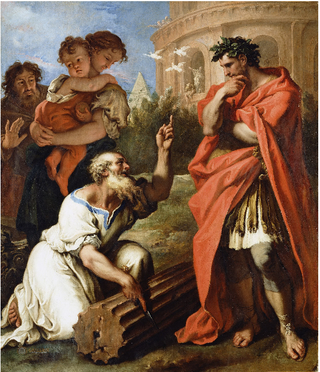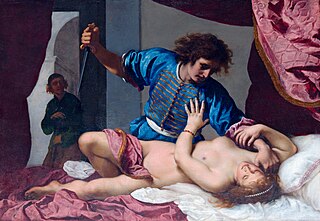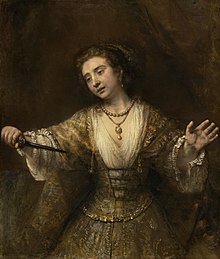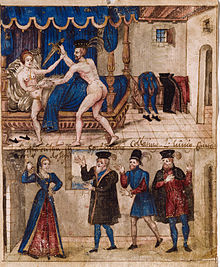
Lucius Tarquinius Superbus was the legendary seventh and final king of Rome, reigning 25 years until the popular uprising that led to the establishment of the Roman Republic. He is commonly known as Tarquin the Proud, from his cognomen Superbus.

According to Roman tradition, Lucretia, anglicized as Lucrece, was a noblewoman in ancient Rome. Sextus Tarquinius (Tarquin) raped her. Her subsequent suicide precipitated a rebellion that overthrew the Roman monarchy and led to the transition of Roman government from a kingdom to a republic. After Tarquin raped Lucretia, flames of dissatisfaction were kindled over the tyrannical methods of Tarquin's father, Lucius Tarquinius Superbus, the last king of Rome. As a result, the prominent families instituted a republic, drove the extensive royal family of Tarquin from Rome, and successfully defended the republic against attempted Etruscan and Latin intervention.

Fidenae was an ancient town of Latium, situated about 8 km north of Rome on the Via Salaria. Its inhabitants were known as Fidenates. As the Tiber was the border between Etruria and Latium, the left-bank settlement of Fidenae represented an extension of Etruscan presence into Latium. The site of the arx of the ancient town was probably on the hill on which lies the contemporary Villa Spada, though no traces of early buildings or defences are to be seen; pre-Roman tombs are in the cliffs to the north. The later village lay at the foot of the hill on the eastern edge of the high-road, and its curia, with a dedicatory inscription to Marcus Aurelius by the Senatus Fidenatium, was excavated in 1889. Remains of other buildings may also be seen.

Lucius Junius Brutus was the semi-legendary founder of the Roman Republic, and traditionally one of its first consuls in 509 BC. He was reputedly responsible for the expulsion of his uncle the Roman king Tarquinius Superbus after the suicide of Lucretia, which led to the overthrow of the Roman monarchy. He was involved in the abdication of fellow consul Tarquinius Collatinus, and executed two of his sons for plotting the restoration of the Tarquins.

The Battle of Lake Regillus was a legendary Roman victory over the Latin League shortly after the establishment of the Roman Republic and as part of a wider Latin War. The Latins were led by an elderly Lucius Tarquinius Superbus, the seventh and last King of Rome, who had been expelled in 509 BC, and his son-in-law, Octavius Mamilius, the dictator of Tusculum. The battle marked the final attempt of the Tarquins to reclaim their throne. According to legend, Castor and Pollux fought on the side of the Romans.

The Rape of Lucrece (1594) is a narrative poem by William Shakespeare about the legendary Roman noblewoman Lucretia. In his previous narrative poem, Venus and Adonis (1593), Shakespeare had included a dedicatory letter to his patron, the Earl of Southampton, in which he promised to compose a "graver labour". Accordingly, The Rape of Lucrece has a serious tone throughout.

Publius Valerius Poplicola or Publicola was one of four Roman aristocrats who led the overthrow of the monarchy, and became a Roman consul, the colleague of Lucius Junius Brutus in 509 BC, traditionally considered the first year of the Roman Republic.
Arruns Tarquinius was one of the sons of Lucius Tarquinius Superbus, the last King of Rome. Ancient sources differ as to whether he was the second or third son. In the earliest accounts, passed through fragments of the first Roman historian, Fabius Pictor, he is the third son. According to Livy and Dionysius of Halicarnassus, he is the second son. Modern historians doubt the historicity of the specific actions attributed to Arruns and other members of his dynasty, regarding them as highly embellished by later accounts.

The gens Tarquinia was a plebeian family at ancient Rome, usually associated with Lucius Tarquinius Priscus and Lucius Tarquinius Superbus, the fifth and seventh Kings of Rome. Most of the Tarquinii who appear in history are connected in some way with this dynasty, but a few appear during the later Republic, and others from inscriptions, some dating as late as the fourth century AD.
Demaratus, frequently called Demaratus of Corinth, was the father of Lucius Tarquinius Priscus, the fifth King of Rome, the grandfather or great-grandfather of Lucius Tarquinius Superbus, the seventh and last Roman king, and an ancestor of Lucius Junius Brutus and Lucius Tarquinius Collatinus, the first consuls of the Roman Republic.

Lucius Tarquinius Ar. f. Ar. n. Collatinus was one of the first two consuls of the Roman Republic in 509 BC, together with Lucius Junius Brutus. The two men had led the revolution which overthrew the Roman monarchy. He was forced to resign his office and go into exile as a result of the hatred he had helped engender in the people against the former ruling house.

Arruns Tarquinius, commonly called Egerius, was a member of the royal family of early Rome.
The Battle of Silva Arsia was a battle in 509 BC between the republican forces of ancient Rome and Etruscan forces of Tarquinii and Veii led by the deposed Roman king Lucius Tarquinius Superbus. It resulted in victory to the nascent Roman Republic.

Spurius Lucretius Tricipitinus is a semi-legendary figure in early Roman history. He was the first Suffect Consul of Rome and was also the father of Lucretia, whose rape by Sextus Tarquinius, followed by her suicide, resulted in the dethronement of King Lucius Tarquinius Superbus, therefore directly precipitating the founding of the Roman Republic. It is believed that Lucretius and his accomplishments are at least partly mythical and most ancient references to him were penned by Livy and Plutarch.

The gens Lucretia was a prominent family of the Roman Republic. Originally patrician, the gens later included a number of plebeian families. The Lucretii were one of the most ancient gentes, and the second wife of Numa Pompilius, the second King of Rome, was named Lucretia. The first of the Lucretii to obtain the consulship was Spurius Lucretius Tricipitinus in 509 BC, the first year of the Republic.
Arruns Tarquinius was the brother of Lucius Tarquinius Superbus, the seventh and last King of Rome.

In Rome's early semi-legendary history, Tarquinia was the daughter of Lucius Tarquinius Priscus, the fifth king of Rome,. Her father, Lucius Tarquinius Priscus, gave her in marriage to Servius Tullius, the sixth king of Rome. She was the mother of Lucius Junius Brutus, who overthrew the monarchy and became one of Rome's first consuls in 509 BC. She had another son, who was put to death by Superbus after he took the Roman rule from Servius.
Titus Tarquinius was one of the sons of the last king of Rome, Lucius Tarquinius Superbus. According to Livy and fragments of the first Roman historian, Fabius Pictor, he was the eldest son; however, Dionysius of Halicarnassus claims he was not.
The overthrow of the Roman monarchy was an event in ancient Rome that took place between the 6th and 5th centuries BC where a political revolution replaced the then-existing Roman monarchy under Lucius Tarquinius Superbus with a republic. The details of the event were largely forgotten by the Romans a few centuries later; later Roman historians presented a narrative of the events, traditionally dated to c. 509 BC, but it is largely believed to be fictitious by modern scholars.

The Rape of Lucretia is any of several paintings, variations of the same subject, which are usually attributed to either Felice Ficherelli or Guido Cagnacci and dated to the late 1630s or about 1640.

















